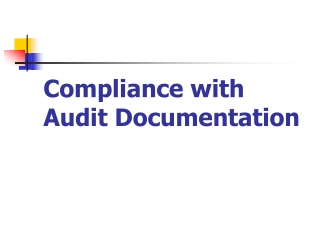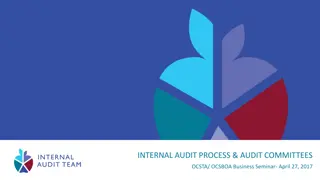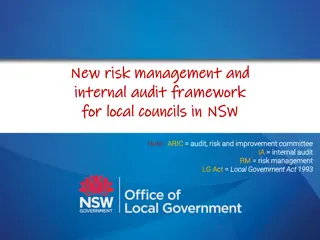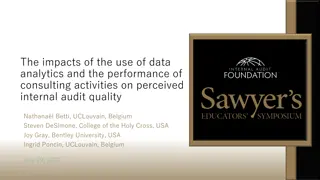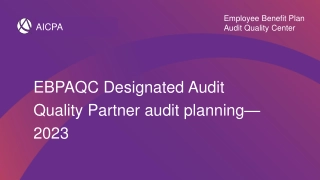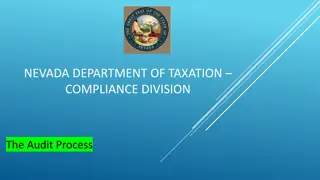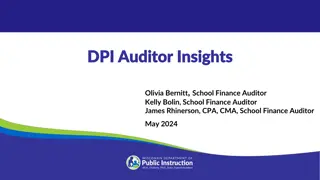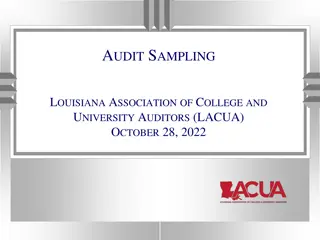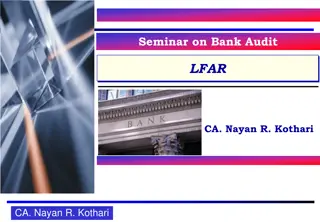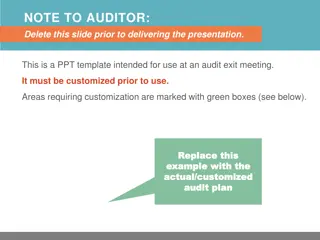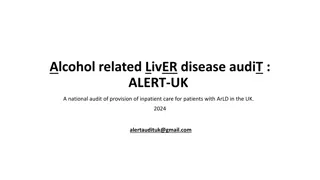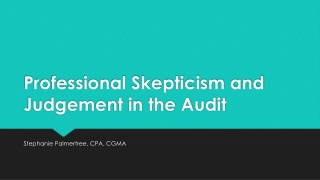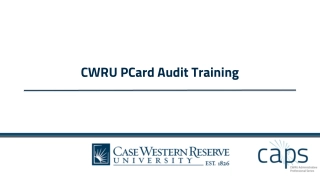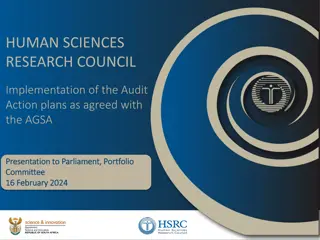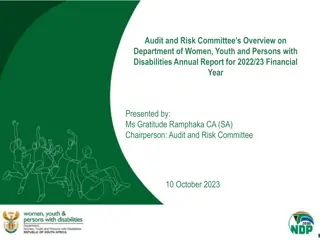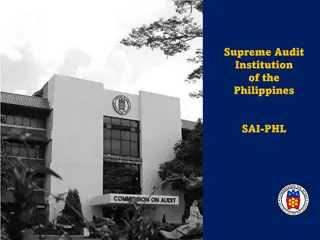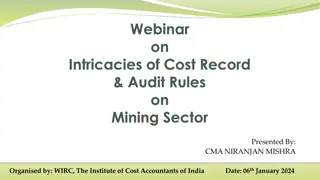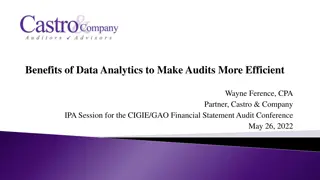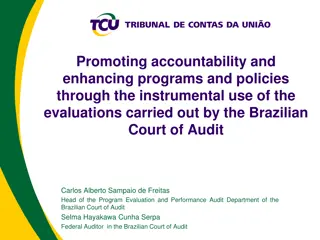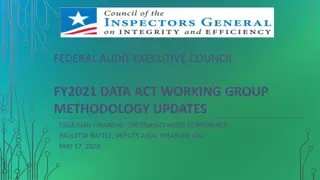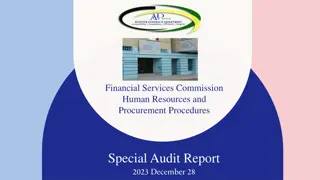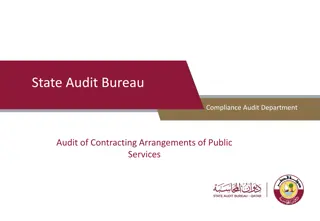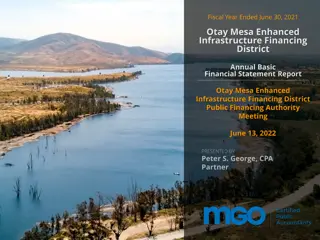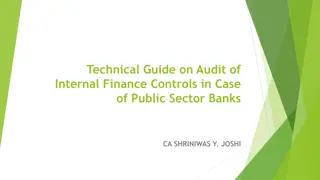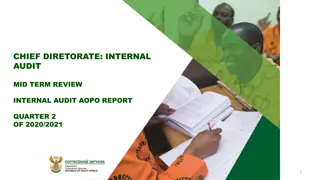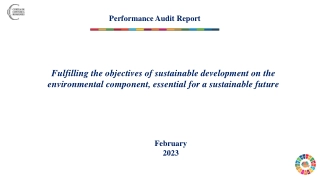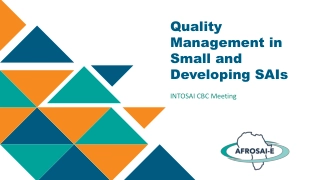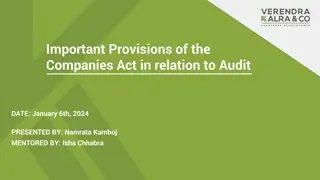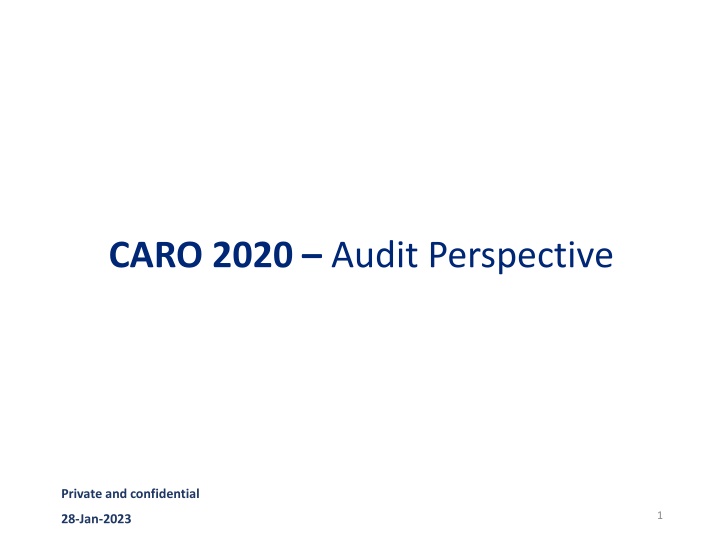
CARO 2020 - Audit Perspective
This document provides an audit perspective on the Companies (Auditor's Report) Order, 2020 (CARO 2020), including its background, applicability, clause-wise reporting requirements, and questions and answers.
Download Presentation

Please find below an Image/Link to download the presentation.
The content on the website is provided AS IS for your information and personal use only. It may not be sold, licensed, or shared on other websites without obtaining consent from the author. Download presentation by click this link. If you encounter any issues during the download, it is possible that the publisher has removed the file from their server.
E N D
Presentation Transcript
CARO 2020 Audit Perspective Private and confidential 1 28-Jan-2023
Contents: Background Applicability Clause-wise reporting requirements Questions & Answers 2
Background: The Ministry of Corporate Affairs (MCA) issued the Companies (Auditor s Report) Order, 2020 ( CARO 2020 ) on 25th February 2020. Initially applicable for each report issued by auditors of specified class of companies, under section 143 of the Companies Act, 2013 ( theAct ) in respect of audits of financial year 2019-20 and onwards. - Subsequently its applicability was deferred to audits of financial year 2021-22 This Order is in supersession of the earlier Order issued in 2016, viz., the Companies (Auditor s Report) Order, 2016 ( CARO 2016 ). No Change in Applicability requirements as compared to CARO 2016 other than requirements of reporting on Consolidating financial statements. CARO 2020 includes several new clauses and has revised certain existing clauses of CARO 2016 4
Background: Summary of changes as compared to CARO 2016: - 7 new clauses added (viii, xiv, xvii, xviii, xix, xx, xxi) - No change in 6 clauses (iv, v, vi, vii, xiii, xv) - Scope expanded in 8 clauses by adding sub clauses (i, ii, iii, ix, x, xi, xii, xvi) - 1 clause related to Managerial Remuneration deleted (erstwhile clause xi). The Order has: - increased the reporting requirements for auditors and - put greater onus on companies to share information with the auditors and users of the financial statements Reasons to be stated for unfavourable or qualified answers - Where the answer to any of the questions referred to in paragraph 3 is unfavourable or qualified, the auditor's report shall also state the basis for the same. - Where the auditor is unable to express any opinion on any specified matter, the report should indicate such fact together with the reasons therefor. 5
Applicability: CARO 2020 is applicable to each company including foreign company (as defined in section 2(42) of the Act), except: 1. Banking Company (as defined in clause (c) of section 5 of the Banking Regulation Act, 1949); 2. Insurance Companies (as defined under the Insurance Act,1938 (4 of 1938); 3. Section 8 Companies (licensed to operate under section 8 of the Companies Act), 2013; 4. One Person Company (as defined in section 2(62) of the Companies Act, 2013); 5. Small Company (as defined in section 2(85) of the Companies Act, 2013); Paid Up Share Capital < Rs. 4 crores Turnover < Rs.40 crores Excludes holding company, Subsidiary company, Sec. 8 Co., Co. / body corporate governed by separate Act 6. Private Company, not being a subsidiary or holding company of a public company, having (cumulatively satisfying all the conditions below): Paid-up Share Capital and Reserves on reporting date < Rs. 1 Crore; and Total Borrowings from banks / FI anytime during the year < Rs. 1 Crore; and Total Revenue for the year < Rs. 10 Crore 7
Applicability: In case a company is covered under the definition of small company, it will remain exempted from the applicability of the Order even if it falls under any of the criteria specified for private company. CARO 2020 also applicable to branches of companies Effect of conversion of a Company (to which the Order is applicable) to exempt category the Order will not apply. The Order will not be applicable to Infrastructure Investment Trusts and Real Estate Investment Trusts. (since they are trusts which are governed by Securities and Exchange Board of India (Infrastructure Investment Trusts) Regulations, 2014 and Securities and Exchange Board of India (Real Estate Investment Trusts) Regulations, 2014, respectively). 8
Clause 3(i): Property, Plant & Equipment and Intangible assets (a) (A) whether the company is maintaining proper records showing full particulars, including quantitative details and situation of Property, Plant and Equipment (PPE); (B) whether the company is maintaining proper records showing full particulars of intangible assets; (new clause) (b) whether these PPE have been physically verified by the management at reasonable intervals; whether any material discrepancies were noticed on such verification and if so, whether the same have been properly dealt with in the books of account; (c) whether the title deeds of all the immovable properties (other than properties where the company is the lessee and the lease agreements are duly executed in favour of the lessee) disclosed in the financial statements are held in the name of the company, if not, provide the details thereof in the prescribed format. 10
Clause 3(i): Property, Plant & Equipment and Intangible assets (d) whether the company has revalued its PPE (including Right of Use assets) or intangible assets or both during the year and, if so, whether the revaluation is based on the valuation by a Registered Valuer; specify the amount of change, if change is 10% or more in the aggregate of the net carrying value of each class of PPE or intangible assets; (e) whether any proceedings have been initiated or are pending against the company for holding any benami property under the Benami Transactions (Prohibition) Act, 1988 (45 of 1988) and rules made thereunder, if so, whether the company has appropriately disclosed the details in its financial statements; Note: The name of the aforesaid Act has been changed to Prohibition of Benami Property Transactions Act, 1988 in the year 2016. Therefore, for the purpose of reporting under this clause, reference should be made to Prohibition of Benami Property Transactions Act, 1988 (as amended in 2016) . 11
Clause 3(i): Property, Plant & Equipment and Intangible assets Considerations for Company Secretaries: - Board resolutions for significant capex - additions / deletions to PPE - Resolutions for approval of Board of Directors for adjustment of any significant discrepancies observed during physical verification of PPE - Title deeds not held in the name of the Company Sec. 187 of the Act also requires properties and investment in the name of the Company For Non Compliance shall be liable to a penalty of five lakh rupees and every officer of the company who is in default shall be liable to a penalty of fifty thousand rupees. Noting of the same by the Board with an action plan to ensure the title deeds are updated Compliance with Sec. 247 of the Act - Appointment of Valuer - by Audit Committee in listed Companies and by the Board in unlisted Company - Benami property held by the Company - Implications on Board s Report 12
Clause 3(ii): Inventory (a) whether physical verification of inventory has been conducted at reasonable intervals by the management and whether, in the opinion of the auditor, the coverage and procedure of such verification by the management is appropriate; whether any discrepancies of 10% or more in the aggregate for each class of inventory were noticed and if so, whether they have been properly dealt with in the books of account; (b) whether during any point of time of the year, the company has been sanctioned working capital limits in excess of five crore rupees, in aggregate, from banks or financial institutions on the basis of security of current assets; whether the quarterly returns or statements filed by the company with such banks or financial institutions are in agreement with the books of account of the Company, if not, give details; 13
Clause 3(iii): Investments, loans, guarantees or security Whether during the year the Company has made investments in, provided any guarantee or security or granted any loans or advances in the nature of loans, secured or unsecured, to companies, firms, Limited Liability Partnerships or any other parties, if so,- (a) whether during the year the Company has provided loans or provided advances in the nature of loans, or stood guarantee, or provided security to any other entity [not applicable to companies whose principal business is to give loans], if so, indicate (A) the aggregate amount during the year, and balance outstanding at the balance sheet date with respect to such loans or advances and guarantees or security to subsidiaries, joint ventures and associates; (B) the aggregate amount during the year, and balance outstanding at the balance sheet date with respect to such loans or advances and guarantees or security to parties other than subsidiaries, joint ventures and associates; 14
Clause 3(iii): Investments, loans, guarantees or security (b) whether the investments made, guarantees provided, security given and the terms and conditions of the grant of all loans and advances in the nature of loans and guarantees provided are not prejudicial to the company s interest; (c) in respect of loans and advances in the nature of loans, whether the schedule of repayment of principal and payment of interest has been stipulated and whether the repayments or receipts are regular; (d) if the amount is overdue, state the total amount overdue for more than ninety days, and whether reasonable steps have been taken by the company for recovery of the principal and interest; 15
Clause 3(iii): Investments, loans, guarantees or security (e) whether any loan or advance in the nature of loan granted which has fallen due during the year, has been renewed or extended or fresh loans granted to settle the overdues of existing loans given to the same parties, if so, specify the aggregate amount of such dues renewed or extended or settled by fresh loans and the percentage of the aggregate to the total loans or advances in the nature of loans granted during the year [not applicable to companies whose principal business is to give loans]; (f) whether the company has granted any loans or advances in the nature of loans either repayable on demand or without specifying any terms or period of repayment, if so, specify the aggregate amount, percentage thereof to the total loans granted, aggregate amount of loans granted to Promoters, related parties as defined in clause (76) of section 2 of the Companies Act, 2013; 16
Clause 3(iv): Sec. 185 & 186 Compliance In respect of loans, investments, guarantees, and security, whether provisions of sections 185 and 186 of the Companies Act have been complied with, if not, provide the details thereof; References - Sec. 185 and 186 of the Act - Declarations in Form MBP-1 from all directors - Register maintained under section 189 of the Act - Relevant extract of Rules 11, 12 & 13 of the Companies (Meeting of Board and its Powers) Rules, 2014 Reporting in cases of non-compliance: - the nature of non-compliance, - the maximum amount outstanding during the year and - the amount outstanding as at the balance sheet date in respect of: (i) the directors; and (ii) any person in whom any of the director of the company is interested (specify the relationship with the director concerned) 17
Clause 3(iv): Sec. 185 & 186 Compliance Considerations for Company Secretaries: Whether, at any point of time during the year in case of aforesaid transactions, the company has exceeded the limit of: - sixty per cent of its paid-up share capital, free reserves and securities premium account or - one hundred per cent of its free reserves as defined in section 2(43) of the Act and securities premium account whichever is more. If it exceeds the limits specified above, whether prior approval by means of a special resolution passed at a general meeting has been obtained. whether the Company has made investments through more than two layers of investment companies Whether rate of interest is not lower than the prevailing yield of one year, three year, five year or ten year government security closest to the tenor of the loan granted. 18
Clause 3(iv): Sec. 185 & 186 Compliance Considerations for Company Secretaries: If the company is in default in the repayment of any deposits accepted or in payment of interest thereon, then the company is not allowed to give any loan or guarantee or provide any security or make an acquisition till such default is subsisting. Whether the Company has maintained a register (as per Form MBP-2) in the manner as prescribed and also check the compliances of other provisions and relevant rules. 19
Clause 3(v): Deposits In respect of deposits accepted by the company or amounts which are deemed to be deposits, - whether the directives issued by the Reserve Bank of India and the provisions of sections 73 to 76 or any other relevant provisions of the Companies Act and the rules made thereunder, where applicable, have been complied with, if not, the nature of such contraventions be stated; - if an order has been passed by Company Law Board or National Company Law Tribunal or Reserve Bank of India or any court or any other tribunal, whether the same has been complied with or not; No major change except inclusion of deemed deposit/s References - Sec. 73 to 76 of the Act - Companies (Acceptance of Deposits) Rules, 2014, as amended - Form DPT-3 [for (a) a return of deposit; (b) particulars of transaction not considered as deposit, or (c) both] Rule 2(1)(c) of the above Rules - Sub-clause (xii) prescribes the instances, where an amount received in the course of, or for the purposes of, the business of the Company would be deemed to be deposit. 20
Clause 3(vi): Cost Records Whether maintenance of cost records has been specified by the Central Government under subsection (1) of section 148 of the Companies Act and whether such accounts and records have been so made and maintained; No change as compared to CARO 2016 These books of account and records form part of the books of account of the company within the meaning of section 2(13) of the Act. The Companies (Cost Records and Audit) Rules, 2014 has specified the list of class of companies in which maintenance of cost record is prescribed under section 148 of the Act. Cost records books relating to utilization of materials, labour and other items of cost as applicable to the production of goods or provision of services as provided in section 148 of the Act, and these rules. These rules also prescribed the items of cost to be included in the books of account. 21
Clause 3(vi): Cost Records As per the said Rules, Cost records are required to be maintained as per the Form CRA-1. The Order does not require a detailed examination of the cost records. A general review of the cost records is expected to ensure that the records as prescribed are made and maintained. Where the auditor finds that the records have not been written or are not prima facie complete, it will be necessary for the auditor to make a suitable comment in his report. Rule 4 of these rules lays down the conditions subject to which the companies covered by these rules need to get their cost records audited. Reporting requirement is regardless of whether a cost audit has been ordered by the central government. Considerations Consistency with the comments on applicability or maintenance of cost records / audit in the Board s Report and CARO. 22
Clause 3(vii): Statutory dues (a) whether the company is regular in depositing undisputed statutory dues including Goods and Services Tax, provident fund, employees' state insurance, income-tax, sales-tax, service tax, duty of customs, duty of excise, value added tax, cess and any other statutory dues to the appropriate authorities and if not, the extent of the arrears of outstanding statutory dues as on the last day of the financial year concerned for a period of more than six months from the date they became payable, shall be indicated; (Change in comparison to CARO 2016 Goods and Services Tax added) (b) where statutory dues referred to in sub-clause (a) have not been deposited on account of any dispute, then the amounts involved and the forum where dispute is pending shall be mentioned (a mere representation to the concerned Department shall not be treated as a dispute); Statutory due - obligation to pay a statutory due is created or arises out of a statute, rather than being based on an independent contractual or legal relationship. 23
Clause 3(vii): Statutory dues Question: Would the following be considered as a statutory due: - any sum payable to an electricity company as electricity bill constitute a statutory due because of the fact that such electricity company has been established under a statute? - Payment of bonus to an employee though the same is under Payment of Bonus Act, 1965. - Dividend payment to shareholders under the Companies Act 2013 Answer: NO. Because these dues have arisen on account of either a contract of supply of goods or services between the parties or out of the contractual obligation with the shareholders. However, dividend declared and not paid to the shareholders within specified time limit and which is required to be transferred to specified fund will be considered as a statutory due. 24
Clause 3(vii): Statutory dues Where Disputed statutory dues are not deposited - Report: Forum, where dispute is pending Amount Involved If only partially disputed report only undisputed . The auditor is not required to examine the sustainability or otherwise of the claim of the company regarding disputed amounts. It is sufficient for his purpose if the evidence available shows that the amount is disputed by the company. Mere representation to the concerned Department shall not be treated as a dispute. Mere show-cause notices should not be construed to be a demand payable by the company unless it also includes a demand. 25
Clause 3(viii): Unrecorded income Whether any transactions not recorded in the books of account have been surrendered or disclosed as income during the year in the tax assessments under the Income Tax Act, 1961 (43 of 1961), if so, whether the previously unrecorded income has been properly recorded in the books of account during the year. A new reporting requirement Emphasis is on the words surrendered or disclosedwhich implies that the company must have voluntarily admitted to the addition of such income, which can be demonstrated on the basis of the returns filed by the company. Review all the tax assessments completed during the year under audit and subsequent to the balance sheet date but prior to signing of the auditor s report if the surrendered or disclosed income relates to the year under audit or prior years. Proper recording, by implication, includes proper disclosure thereof in the financial statements. The disclosure in the financial statements should be sufficient to enable the users understand the impact of such transactions. 26
Clause 3(ix): Borrowings (a) Whether the company has defaulted in repayment of loans or other borrowings or in the payment of interest thereon to any lender, if yes, the period and the amount of default to be reported with below details: Nature of Borrowings (incl. debt securities Name of Lender Amount not paid on due date Whether principal/ interest? No. of days delay Borrowings do not include public deposits as the reporting on public deposits is covered by clause 3(v) of the Order. Even preference share capital should not be considered as borrowings If Loans / borrowings and / or interest are repayable on demand and no repayment terms have been specified in the agreement - Obtain a management representation letter confirming that such loans/ borrowings and/ or interest have not been demanded for repayment and state so in the report. 27
Clause 3(ix): Borrowings (b) whether the company is a declared wilful defaulter by any bank or financial institution or other lender; RBI vide its master circular RBI/2014 15/73 DBR. No. CID.BC.57/20.16. 003 / 2014-15 dated July 1, 2014 on Wilful Defaulters ( RBICircular ) as updated from time to time has defined cases where a "wilful default" would be deemed to have occurred. Triggering event - default in payment of Interest and or principle (c) whether term loans were applied for the purpose for which the loans were obtained; if not, the amount of loan so diverted and the purpose for which it is used may be reported; Term loans normally have a fixed or pre-determined repayment schedule usually with repayment period beyond 36 months Not necessary to establish a one-to-one relationship with the amount of term loan and its utilisation. Temporary investment of loan funds pending utilisation for the stated purpose - but were ultimately utilised for the stated end-use. 28
Clause 3(ix): Borrowings (d) whether funds raised on short term basis have been utilised for long term purposes, if yes, the nature and amount to be indicated; Examples - Investing money from overdraft facilities in long-term investments in shares of subsidiaries/associates/joint ventures or investing money raised from public deposits due for repayment in three years in a project whose pay-back period is ten years. Principle of fund management - short term finds for short term usage and long term borrowed funds for long term usage for good financial health. (e) whether the Company has taken any funds from any entity or person on account of or to meet the obligations of its subsidiaries, associates or joint ventures, if so, details thereof with nature of such transactions and the amount in each case; (f) whether the Company has raised loans during the year on the pledge of securities held in its subsidiaries, joint ventures or associate companies, if so, give details thereof and also report if the company has defaulted in repayment of such loans raised; 29
Clause 3(x): Funds raised through IPO/FPO (a) whether moneys raised by way of initial public offer or further public offer (including debt instruments) during the year were applied for the purposes for which those are raised, if not, the details together with delays or default and subsequent rectification, if any, as may be applicable, be reported; The reporting under this clause also seeks to cover the details of non- compliances in respect of moneys which were raised during the previous accounting period but were actually utilized in the current accounting period. (b) whether the company has made any preferential allotment or private placement of shares or convertible debentures (fully, partially or optionally convertible) during the year and if so, whether the requirements of section 42 and section 62 of the Companies Act, 2013 have been complied with and the funds raised have been used for the purposes for which the funds were raised, if not, provide details in respect of amount involved and nature of non- compliance; 30
Clause 3(x): Funds raised through IPO/FPO Offer or invitation to subscribe to securities cannot be made unless the proposal has to be previously approved by the shareholders of the company, by a special resolution for each of the offers or invitation Money raised through private placement cannot be utilised unless allotment is made and the return of allotment is filed with the Registrar Allotment of securities to be done within 60 days from the date of receipt of the application money and if the company is not able to allot the securities within that period, it shall repay the application money to the subscribers within 15 days from the expiry of 60 days. Allotment of securities under section 42 of the Act - return of allotment in Form PAS-3 to be filed with the Registrar within 15 days from the date of allotment. Considerations for Company Secretaries: Compliance with sections 42 and 62 of the Act to be ensured 31
Clause 3(xi): Fraud (a) whether any fraud by the company or any fraud on the company has been noticed or reported during the year, if yes, the nature and the amount involved is to be indicated; This clause does not require the auditor to discover such frauds. It is restricted to frauds noticed or reported during the year. Types - Fraudulent financial reporting & Misappropriation of assets Irrespective of the auditor s comments under this clause, the auditor is also required to comply with the requirements of SA 240, TheAuditor s Responsibilities Relating to Fraud in an Audit of Financial Statements . As also required to comply with the requirements of section 143(12) of the Act. 32
Clause 3(xi): Fraud Example of reporting: We have been informed that the accountant of the company had misappropriated funds amounting to rupees ten lakhs during the preceding year and the year under audit. Investigations are in progress and the accountant has been dismissed and arrested. The company has withheld his terminal benefits and it is estimated that the amount misappropriated may not exceed the terminal benefits due to the accountant. The company is also adequately covered by fidelity insurance cover. 33
Clause 3(xi): Fraud (b) whether any report under sub-section (12) of section 143 of the Companies Act has been filed by the auditors in Form ADT-4 as prescribed under rule 13 of Companies (Audit and Auditors) Rules, 2014 with the Central Government; As per Section 143(12) of the Act read with Rule 13(1) of the Companies (Audit and Auditors) Rules, 2014: Reporting timelines as per 143(12) fraud involving amount of Rs. 1 crore or more - To the Board /e Audit Committee within 2 days of his knowledge seeking responses within 45 days - To the Central government in Form ADT-4 within 15 days from receipt of responses or 45 days if no responses received (c) whether the auditor has considered whistle-blower complaints, if any, received during the year by the company; Establishment of whistle-blower mechanism not mandatory for all companies U/s 177(9) of the Act Vigil Mechanism mandatory for specified companies Where not mandatory Management enquiries, review any complaints shared and representations 34
Clause 3(xii): Nidhi Company (a) whether the Nidhi Company has complied with the Net Owned Funds to Deposits in the ratio of 1: 20 to meet out the liability; (b) whether the Nidhi Company is maintaining ten per cent. unencumbered term deposits as specified in the Nidhi Rules, 2014 to meet out the liability; (c) whether there has been any default in payment of interest on deposits or repayment thereof for any period and if so, the details thereof; "Nidhi" - A company which has been incorporated as a nidhi with the object of cultivating the habit of thrift and saving amongst its members, receiving deposits from, and lending to, its members only, for their mutual benefit, and which complies with the rules made by the central Government for regulation of such class of companies. Applicable Rules to Nidhi Companies Sec. 406 of the Act - Nidhi Rules 2014 Reporting of the period and amount of all defaults: - Existing as at the year-end; and - Defaults existing during any period and made good during the year 35
Clause 3(xiii): Related Party transactions Whether all transactions with the related parties are in compliance with sections 177 and 188 of Companies Act where applicable and the details have been disclosed in the financial statements, etc., as required by the applicable accounting standards; No change as compared to CARO 2016 Related Parties as defined in Sec 2(76) of the Act Completeness of related parties - Reference documents: - MBP-1 declarations by all Directors - Declarations made by directors of any changes during the year - Group structure with shareholding pattern Compliance with sections 177 and 188 of the Act. Sec 177 approval of audit committee for transactions with related parties Sec. 188 - Transactions covered include sale / purchase of goods or services, leasing of property, buying or selling of any property etc. If transactions not on arm length prior consent of Board required Accounting Standards applicable AS 18 or IND AS 24 36
Clause 3(xiv): Internal audit (a) whether the company has an internal audit system commensurate with the size and nature of its business; (b) whether the reports of the Internal Auditors for the period under audit were considered by the statutory auditor; Section 138 of the Act mandates internal audit system to Listed companies Private limited companies if - - PY turnover > Rs.200 crores OR - Outstanding loans/borrowings from banks/public FI is > or equal to Rs.100 crores Unlisted public limited companies if - Paid up share capital is > Rs. 50 crores during the previous FY or - Turnover is > Rs. 200 crores during previous FY or - Outstanding loans / borrowings from banks/public financial institutions is > or equal to Rs.100 crores at any time during the previous FY or - Outstanding deposits is > or equal to Rs. 25 crores at any time during the previous FY. 37
Clause 3(xv): Non-cash transactions Sec.192 Whether the company has entered into any non-cash transactions with directors or persons connected with him and if so, whether the provisions of section 192 of Companies Act have been complied with; Section 192 of the Act - Restriction on non-cash transactions involving directors Unless prior approval for such arrangement is accorded by a resolution of the company in general meeting, no Company shall enter into an arrangement with a director of the company associate company or a person connected with him where: or its holding, subsidiary or a director of the company or its holding, subsidiary or associate company or a person connected with him acquires or is to acquire assets for consideration other than cash, from the company; or the company acquires or is to acquire assets for consideration other than cash, from such director or person so connected 38
Clause 3(xv): Non-cash transactions Sec.192 Documents / records for evidence of such transactions: Persons connected to the director Form No. MBP 1, Notice of Interest by Director, filed pursuant to the Companies (Meetings of Board and Its Powers) Rules, 2014 Acquisition by/ from the Company Form No. MBP 2, Register of Loans, Guarantee, Security and Acquisition Made by the company, filed pursuant to the Companies (Meetings of Board and Its Powers) Rules, 2014 Form No. MBP 4, Register of Contracts with Related Party and Contracts and Bodies etc in which Directors are Interested, Minutes book of the General Meeting and Meetings of Board of Directors Report on Annual General Meeting pursuant to Companies (Management and Administration) Rules, 2014 in Form No. MGT 15 39
Clause 3(xvi): Non-banking financial institutions (a) whether the company is required to be registered under section 45-IA of the Reserve Bank of India Act, 1934 (2 of 1934) and if so, whether the registration has been obtained; (b) whether the company has conducted any Non-Banking Financial or Housing Finance activities without a valid Certificate of Registration (CoR) from the Reserve Bank of India as per the Reserve Bank of India Act, 1934; (c) whether the company is a Core Investment Company (CIC) as defined in the regulations made by the Reserve Bank of India, if so, whether it continues to fulfil the criteria of a CIC, and in case the company is an exempted or unregistered CIC, whether it continues to fulfil such criteria; (d) whether the Group has more than one CIC as part of the Group, if yes, indicate the number of CICs which are part of the Group; 40
Clause 3(xvii): Cash Losses Whether the company has incurred cash losses in the financial year and in the immediately preceding financial year, if so, state the amount of cash losses; The term cashlosses is not defined in the Act and the accounting standards / Indian accounting standards. Also no readily available from the financial statements. The term cashlosses needs to be distinguished from distributablesurplus and realisedprofits/losses . Cash Losses - normally determined by adjusting the figure of net profit/loss after taxes (PLAT) shown by the statement of profit and loss for effects of transactions of non-cash nature such as: - depreciation on Property, Plant & Equipment, - amortization of Intangible Assets, - impairment loss or its reversal accounting standard on Impairment of Assets, - deferred tax income/expense, - foreign exchange gain/loss, - fair value changes for determination of cash losses etc. 41
Clause 3(xviii): Resignation of Statutory Auditors Whether there has been any resignation of the statutory auditors during the year, if so, whether the auditor has taken into consideration the issues, objections or concerns raised by the outgoing auditors; Communication by the new auditor with the outgoing auditors important to understand and address any issues, objections or concerns raised by them. Such communication also required as per the ICAI Code of Ethics Section 140(2) of the Act read with Rule 8 of the Companies (Audit and Auditors) Rules 2014 requires the auditor who has resigned from the company to file within a period of thirty days from the date of resignation, a statement in Form ADT 3 - Notice of Resignation by the Auditor, with the Registrar of Companies (ROC) indicating the reasons and other facts as may be relevant with regard to his resignation. 42
Clause 3(xix): Repayment of Liabilities Material Uncertainty? On the basis of the financial ratios, ageing and expected dates of realisation of financial assets and payment of financial liabilities, other information accompanying the financial statements, the auditor s knowledge of the Board of Directors and management plans, whether the auditor is of the opinion that no material uncertainty exists as on the date of the audit report that company is capable of meeting its liabilities existing at the date of balance sheet as and when they fall due within a period of one year from the balance sheet date; As per Accounting Standard 1 - Going Concern is a fundamental assumption disclosure is warranted if that assumption is not followed. Ind AS 1, requires that when preparing financial statements, management shall make an assessment of an entity s ability to continue as a going concern. Going concern assumption may be appropriate due to support letters provided by the holding company, but the company may not be able to meet its liabilities falling due within a period of one year from the balance sheet date. evaluate whether the holding company has the ability to discharge the financial liabilities of the company as and when they fall due. 43
Clause 3(xix): Repayment of Liabilities Material Uncertainty? Auditors to review: Liquidity ratios such as current ratio, acid-test ratio, cash ratio and efficiency ratios such as asset turnover ratio, inventory turnover ratio, accounts receivable turnover ratio etc. Director s report, management discussion and analysis forming part of the annual report of the company Interim financial information prepared after the balance sheet date e.g., MIS for subsequent months, cash flow projections for the future period of 12 months from the date of balance sheet, to assess the assumptions of the management. Minutes of Audit Committee meeting and Board of Directors meeting held after the balance sheet date. 44
Clause 3(xx): CSR (a) whether, in respect of other than ongoing projects, the company has transferred unspent amount to a Fund specified in Schedule VII to the Companies Act within a period of six months of the expiry of the financial year in compliance with second proviso to sub-section (5) of section 135 of the said Act; Failure to spend the required amount the Board shall, in its report made under clause (o) of sub-section (3) of section 134, specify the reasons for not spending the amount and, unless the unspent amount relates to any ongoing project referred to in sub-section (6), transfer such unspent amount to a Fund specified in Schedule VII, within a period of six months of the expiry of the financial year. Reference to the Board Report consistency in reporting of facts Schedule VII funds (such as Contribution to the Prime Minister s National Relief Fund or Prime Minister's Central Assistance and Relief in Emergency Situations Fund (PM CARES Fund) or any other fund set up by the Central Government for socio-economic development and relief and welfare of the Scheduled Castes, the Schedule Tribes, other backward classes, minorities and women) 45
Clause 3(xx): CSR Excess amount spent by the Company can be carried forward and set off against obligation for next 3 years - subject to the conditions specified in the CSR Rules, as amended. If amount has not been transferred to special account within time, the following be reported: Non-compliance to CSR provisions will lead to penalty of twice the amount required to be transferred to the Fund specified in Schedule VII or Rs one crore, whichever is less. Further, every officer who is in default is liable to a penalty of one-tenth of amount required to be transferred by the company to such fund specified in Schedule VII or the unspent CSR amount, or Rs. 2 lakhs, whichever is less. 46
Clause 3(xx): CSR (b) whether any amount remaining unspent under sub-section (5) of section 135 of the Companies Act, pursuant to any ongoing project, has been transferred to special account in compliance with the provision of sub-section (6) of section 135 of the said Act; Account in any scheduled bank to be called the Unspent Corporate Social Responsibility Account, - Amount to be spent by the company in pursuance of its obligation towards the CSR Policy within a period of 3 financial years from the date of such transfer, failing which, the company shall transfer the same to a Fund specified in Schedule VII, within a period of thirty days from the date of completion of the third financial year. If amount has not been transferred to special account within time, the following be reported: 47
Clause 3(xxi): Qualifications / Adverse remarks in CARO Reports of entities consolidated Whether there have been any qualifications or adverse remarks by the respective auditors in the Companies (Auditor's Report) Order (CARO) reports of the companies included in the consolidated financial statements, if yes, indicate the details of the companies and the paragraph numbers of the CARO report containing the qualifications or adverse remarks. 48

